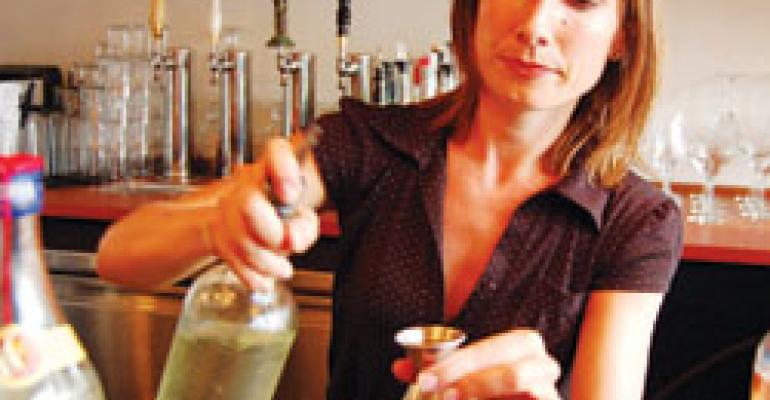Start with an idea for a flavor, then just add water. That’s the philosophy behind a new wave of still and carbonated beverages appearing on restaurant menus.
As many operations begin to move away from bottled waters, flavored waters are emerging as a way to put a distinctive stamp on filtered tap water. In other cases, flavored flat or fizzy waters are positioned as a fun alternative to alcoholic beverages and traditional sodas or a way to let beverages reflect a restaurant’s food philosophy.
At Coi restaurant in San Francisco, for example, sommelier-partner Paul Einbund’s “hydrosol” beverages, $6, have become quite popular. Einbund says that a hydrosol, a byproduct of essential oil production, has the essence of a flavor in a form that is less intense and more digestible than the essential oil. Einbund purchases hydrosol flavors in small dropper bottles and adds 4 to 14 drops to a wine glass of still or sparkling water.
“It’s not like a soft drink that tastes like orange soda or something,” Einbund says, “but it’s water that has the essence of the [flavor], and these are just very pure and clean, and you can get all kinds of interesting flavors.
“The most popular one is probably the passion fruit. It’s incredibly strong and powerful and one sniff makes your mouth water. It’s incredibly refreshing. You just get the essence as opposed to the juice, which would be sweet and thick.”
Other hydrosol flavors Coi has offered include rose, lime and chrysanthemum. Einbund says the aromatic beverages complement the cuisine of chef Daniel Patterson, which emphasizes aromatics and includes a lot of essential oils. Patterson’s interest in aromatics has been bolstered by his work with Mandy Aftel, his co-author for “Aroma: The Magic of Essential Oils in Foods and Fragrance,” published in 2004.
The hydrosol beverages are made with the restaurant’s still water or bottled sparkling water, both filtered in house. Coi currently does not sell any bottled still water.
Broadway East, a new restaurant slated to open in New York next month, will have no bottled water whatsoever. A comprehensive filtering system will filter all water as it enters from the street. Chef Peter Berley plans to offer guests the filtered still water in a carafe for free and house-carbonated water in a stoppered bottle for $3 per liter.
While he currently has no plans to flavor still water, he is contemplating a menu of specialty sodas in such flavors as coffee, ginger and vanilla. Looking forward to spring, and in keeping with the local and seasonal emphasis of the menu, Berley is considering strawberry-rhubarb soda. What sodas make it to the menu will depend upon the as-yet-undetermined degree of carbonation achieved in-house and how well the restaurant’s own bubbly will hold up when combined with a simple syrup or fruit purée.
Berley’s cuisine will be “flexitarian” which means mostly vegetarian but with some animal products as well. He has a book out on flexitarian cuisine.
At District restaurant, in Kimpton’s Muse Hotel in New York City’s theater district, executive chef Patricia Williams is experimenting with flavored waters to put her own spin on the water-filtering system being adopted by Kimpton properties in the Northeast as part of the chain’s “Earth Care Initiative.” Restaurants using the Aqua Health filtration system will fill reusable bottles with still or sparkling filtered water.
To give house-filtered water “just a little more of a lift, we thought we’d do things that are seasonal,” Williams says. “For example, in the summer, we would do peaches and raspberry water. It would come in a separate container, so it would almost be like cocktail service.”
To prepare the flavored waters, Williams purées and blends the ingredients, then strains out the juice to remove pulp and leave a clear syrup. Williams anticipates charging an additional $2 per bottle on top of the $5 currently charged for an unflavored bottle of Aqua Health. Other flavors she is considering include cucumber and lemon grass, plum and fresh ginger, and something citrus, perhaps ugli fruit, for winter.
She intends to offer water simply flavored with these ingredients, but could add a bit of house-made simple syrup if a guest wants a hint of sweetness.
Williams already offers a “soda of the day”—blueberries sweetened with simple syrup, blended and strained, for example, or pineapple-lime.
Specialty sodas are also the name of the game for Erin Ward, general manager and resident mixologist at Trestle on Tenth in Manhattan. Ward says her seasonally changing beverages fit the restaurant’s dedication to seasonal cuisine. She also thinks customers who prefer not to drink alcohol are eager for alternatives to regular colas.
Summer choices included honeydew, pear-ginger, cherry-lemon and apricot-lime, as well as “Bramble”—which combined blackberry, raspberry and lemon-verbena syrup. The beverages are $4.
As the year moves into citrus season, Ward anticipates bringing back the grapefruit-rosemary soda that she developed last year.
“I’ve made liqueurs with grapefruit, but I’m also interested to make nonalcoholic options as well,” she says. “So I kind of did a nonalcoholic version, where I would take the grapefruit rind and basically steep that in sugar and water along with some fresh rosemary, and then make a simple syrup and add it to a nice sparkling water.”
At Graffiti, a new restaurant in Manhattan, fenugreek water evokes the Bombay childhood of chef-owner Jehangir Mehta. In India, Mehta says, fenugreek is considered very good for the blood, and he mentions that recent studies have suggested that fenugreek is useful in lowering blood cholesterol and in helping to control diabetes.
For the traditional preparation, fenugreek seeds are soaked in water in a copper or silver vessel overnight, and the family would drink the resulting infused water in the morning. At Graffiti, fenugreek water, made with filtered water, is served in a water glass and offered at room temperature, the way Mehta drank it in India, but customers can request ice. It sells for $4.




